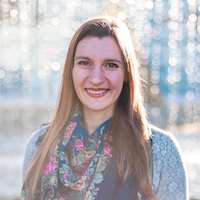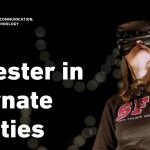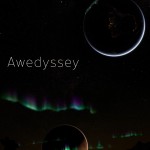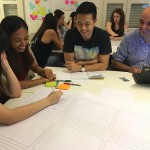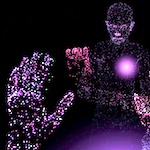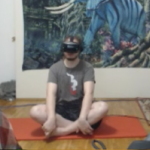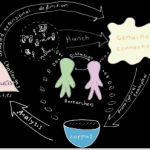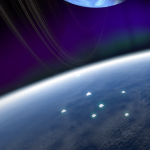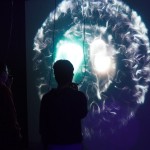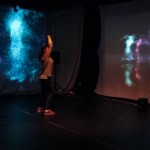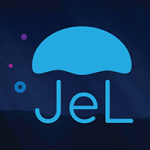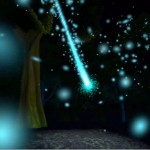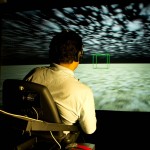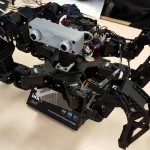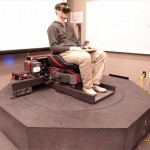Katerina Stepanova, PhD
Biography
Dr. Katerina Stepanova graduated from the Cognitive Science program with honours from SFU and continued into a graduate program at iSpace lab where she completed her MSc and PhD degrees. Her PhD thesis is titled “Intercorporeal Design: Staging Mediated Embodied Interactions to Dissolve Self-Other Boundary to Support Felt Connection”
She strives to understand how the immersive powers of modern technology can be leveraged to help people become more connected with themselves, each other and the world around them. Through an embodied cognition and phenomenological lens, she explores the possibility of crafting transformative and intimate experiences with the use of Virtual Reality and biofeedback technologies for genuine connection. She explores these designs in controlled lab conditions as well as in a public setting in a form of art installations.
She is fascinated by different ways of creating knowledge in art, science and humanities, and as such engages with a variety of quantitative and qualitative methodologies, such as research through design, experimental design, physiological measures, behavioural measures, observational studies, micro-phenomenology, hermeneutic phenomenology, autoethnography, and close reading.
In 2022 Katerina has conducted research visits and internships with Kristina Höök at KTH University in Stockholm sponsored by SSHRC Michael Smith Foreign Study Scholarship Supplement, and with Alexander Stahn at Charité Universitaetsmedizin in Berlin sponsored by DAAD research grant.
Outside the lab she explores the outdoors by climbing mountains, biking, kayaking and snowboarding, finding her inspiration in experiencing a connection with the spectacular nature of British Columbia, or practising yoga or swing dancing to foster bodily awareness which in turn informs her research.
Select Grants & Awards
Banting Postdoctoral Fellowship (2024−2026)
SSHRC Joseph-Armand Bombardier Canadian Doctoral Scholarship (2021−2024)
German Academic Exchange Service (DAAD) Short-term Research Grant (2022)
Projects
How can AI tools like ChatGPT transform creativity, collaboration, and critical thinking in interdisciplinary education? And what are the risks of over-relying on AI tools in education, and how can students and educators navigate these challenges? How do students feel about using AI tools in their learning? What did they learn, and what would they do differently next time?
Lessons Learned from Un...
We are investigating and creating a new virtual reality (VR) experience, 'Awedyssey', for the promotion and enhancement of well-being. Today, digital technology pervasively intersects with our daily lives, and VR stands out as a digital tool capable of fostering positive emotion like awe, self-transcendence, and authentic social connection.
Connecting with nature is very important for our mental...
Designing with Biosignals: Challenges, Opportunities, and Future Directions for Integrating Physiological Signals in Human-Computer Interaction
ABSTRACT
Biosensing technologies are a rapidly increasing presence in our daily lives. These sensor-based technologies measure physiological processes including heart rate, breathing, skin conductance, brain activity and more. Researchers are exploring...
Embodied Telepresent Connection (ETC): Exploring Virtual Social Touch Through Pseudohaptics
ETC (Embodied Telepresent Connection) is an artistic VR project exploring ways of eliciting a feeling of embodied connection telepresently through pseudohaptics. This project emerged during the beginning of COVID-19-related lockdowns when our social interactions began to inhabit nearly exclusively virtual ...
Sipping the Virtual Elixir: An autoethnographic close reading of Ayahuasca Kosmik Journey a self-transcendent virtual experience.
Recently self-transcendent experiences are gaining interest in the research community because of their ability to support wellbeing. Experiences of self-transcendence can be transformative, leading to a diminishment of self/ego and the feeling of unity with n...
There is a prominent interest in the potential of technology for mediating social connection, with a wealth of systems designed to foster the feeling of connection between strangers, friends, and family. In this project, we are exploring this design landscape to derive a transitional definition of mediated genuine connection and design strategies employed by artists and designers to support the f...
SIRIUS (Scientific International Research in Unique Terrestrial Station) is a series of on-land isolation experiments modelling long-term spaceflight in order to assess the psychophysiological effects of isolation on a crew and prepare for long-duration spaceflights, such as a trip to Mars. An 8-month-long isolation study commenced in Moscow on Nov 4th, 2021, where a crew of 6 people (from Roscosm...
Flying dreams have the potential to evoke a feeling of empowerment (or self-efficacy, confidence in our ability to succeed) and self-transcendent experience (STE), which have been shown to contribute to an individual’s overall well-being. However, these exceptional dreaming experiences remain difficult to induce at will. Inspired by the potential of Virtual Reality (VR) to support profound emoti...
One must first come to know, through observing oneself — just what one does with breathing. - Elsa Gindler
Breath of light is a generative interactive installation, exhibited at the 13th Shanghai Biennale. The installation aims to foster a feeling of connection and awareness through the process of breathing synchronization. Each of the two participants generates their own light with their breat...
Extending Bodies to Stimulate Social Connection in an Immersive Installation
Body RemiXer connects bodies through movement. It is an experiential projection based Virtual Reality installation that explores novel forms of embodied interaction between multiple participants where their bodies mix into a shared embodied representation producing a playful interaction that aims to support the feeling o...
Can a bio-responsive generative art installation foster interpersonal synchronization and connection?
JeL is a bio-responsive, immersive, interactive, generative art installation designed to encourage physiological synchronization between the immersants. In this project, we will be exploring how novel forms of interaction can be included in immersive technology to foster the feeling of connection...
Do you get enough “awe” in your life? In our busy day-to-day lives, we often take our experiences for granted. While we have the technology to connect with one another, like smart phones, we don’t necessarily get outside with nature, or stargaze. Such activities may consist of common awe-inspiring moments, and we now understand that feeling awe is associated with all sorts of social and well...
How can we use immersive VR to give people pivotal positive experiences without having to send them out into space?
“We went to the Moon as technicians, we returned as humanitarians” reflected Edgar Mitchell after his space flight. This describes the overview effect – a profound awe-inspiring experience of seeing Earth from space resulting in a cognitive shift in worldview, le...
How do we best design locomotion interfaces for VR that provide "enough" physical motion cues (vestibular/proprioceptive) while still being effective, affordable, compact, and safe?
Despite amazing progress in computer graphics and VR displays, most affordable and room-sized VR locomotion interfaces provide only little physical motion cues (e.g., vestibular & proprioceptive cues). To provide...
Developing virtual interfaces for embodied tele-operation and locomotion.
How can we best design and implement an embodied telepresence system for tele-robotics, so we can safely explore remote, hard-to-reach, or potentially hazardous areas or situations?
The goal of the "TeleSpider" project is to design and implement a telepresence system where users can remotely operate a robotic spid...
How important are physical motions for effective spatial orientation in VR?
Most virtual reality simulators have a serious flaw: Users tend to get easily lost and disoriented as they navigate. According to the prevailing opinion, this is because physical motion cues are absolutely required for staying oriented while moving. In this study, we investigated how physical motion cues contribute ...
Publications
http://ispace.iat.sfu.ca/wp-content/plugins/zotpress/
37904
Stepanova, E. R., Heyde, M. von der, Kitson, A., Schiphorst, T., & Riecke, B. E. (2017). Gathering and Apply Guidelines for TeleSpider Design for Urban Search and Rescue Applications on a Mobile Robot. In M. Kurosu (Ed.), Human-Computer Interaction. Interaction Contexts (HCI 2017) (Vol. 10272, pp. 562–581). Springer.
37904
Wrainwright, N., Stepanova, E. R., Aguilar, I., Kitson, A., & Riecke, B. E. (2019, June).
Transcending the Lab: Supporting Self-Transcendent Experiences in VR [Talk]. FCAT Undergraduate Conference, Surrey City Hall, BC, Canada.
https://www.sfu.ca/fcat/events/ugc.html
37904
Stepanova, Ekaterina, Denise Quesnel, Alexandra Kitson, Mirjana Prpa, Ivan Aguilar, and Bernhard E. Riecke. 2018. “A Framework for Studying Transformative Experiences through VR.” Symposium presentation presented at the 23rd Annual CyberPsychology, CyberTherapy & Social Networking Conference, Gatineau, Canada, June.
http://interactivemediainstitute.com/cypsy23/.
37904
Stepanova, Ekaterina R., Denise T. Quesnel, and Bernhard E. Riecke. 2019. “Space - a Virtual Frontier: How to Design and Evaluate a Virtual Reality Experience of the Overview Effect Promoting The Feeling of Connectedness.” Frontiers in Digital Humanities - Human-Media Interaction 6 (7): 1–22. https://doi.org/10.3389/fdigh.2019.00007.
37904
Stepanova, Ekaterina R., Denise T. Quesnel, and Bernhard E. Riecke. 2019. “Understanding AWE: Can a Virtual Journey, Inspired by the Overview Effect, Lead to an Increased Sense of Interconnectedness?”
Frontiers in Digital Humanities - Human-Media Interaction 6 (9): 1–21.
https://doi.org/10.3389/fdigh.2019.00009.
37904
Quesnel, Denise, Ekaterina R. Stepanova, Ivan Aguilar, Patrick Pennefather, and Bernhard E. Riecke. 2018. “Creating ‘AWE’: Combining Artistic Intuition and Research-Based Design for an Emotionally-Profound Art Installation.” 2018 IEEE Games, Entertainment, Media Conference (GEM) (Full Paper) (Galway, Ireland), August, 1–8. https://doi.org/10.1109/GEM.2018.8516463.
37904
Stepanova, Ekaterina, Denise Quesnel, and Bernhard E. Riecke. 2018. “Transformative Experiences Become More Accessible through Virtual Reality.” 2018 IEEE Workshop on Augmented and Virtual Realities for Good (VAR4Good) (Reutlingen, Germany), March, 1–3. https://doi.org/10.1109/VAR4GOOD.2018.8576881.
37904
Stepanova, K. (2021, October 31). Virtual reality can combat isolation with awe and empathy — on Earth and in space.
The Conversation.
http://theconversation.com/virtual-reality-can-combat-isolation-with-awe-and-empathy-on-earth-and-in-space-170189
37904
Sirius. (2021, October 1). [Curated & peer-reviewed Virtual Reality Exhibition]. V-Unframed, Vancouver, BC, Canada.
https://www.alliancefrancaise.ca/v-unframed/the-artworks/sirius/
37904
Riecke, Bernhard E., Ekaterina R. Stepanova, and Alexandra Kitson. 2016. “New Response Patterns in Point-to-Origin Tasks Depending on Stimulus Type and Response Mode.” Talk presented at the International Meeting of the Psychonomic Society, Granada, Spain, May.
https://youtu.be/miiPjAUb77Y.
37904
Stepanova, Ekaterina R., K. Brauns, A Friedl-Werner, Noah Miller, John Desnoyers-Stewart, Ashu Adhikari, Bernhard E. Riecke, and Alexander C. Stahn. 2022. “A Neurophenomenological Approach to Better Understand the Effects of Eliciting Positive Experiences in Virtual Reality.” Poster presented at the Phenomenological Methods in Neuroscience and Consciousness Research workshop, University of Zürich.
37904
Quesnel, Denise, Ekaterina R. Stepanova, Ivan Aguilar, Alexandra Kitson, and Bernhard E. Riecke. 2017. “AWE.” Invited Virtual Reality Exhibition. SPLASH, Vancouver, BC, Canada, Vancouver, BC, Canada.
37904
Quesnel, Denise, Ekaterina R. Stepanova, Ivan Aguilar, Alexandra Kitson, and Bernhard E. Riecke. 2017. “AWE.” Invited Virtual Reality Exhibition. TEDxEastVan, Vancouver, BC, Canada, Vancouver, BC, Canada.
37904
Quesnel, Denise, Ekaterina R. Stepanova, Ivan Aguilar, Alexandra Kitson, and Bernhard E. Riecke. 2017. “AWE.” Invited Virtual Reality Exhibition. TEDxSFU, Vancouver, BC, Canada, Vancouver, BC, Canada.
37904
Kitson, Alexandra, Ekaterina R. Stepanova, Abraham M. Hashemian, et al. 2016. “TeleSpider: Investigating Motion-Cueing Interfaces for Control of a Remote Robotic Spider.” Project exhibition. Consumer Virtual Reality (CVR) conference, Vancouver, BC, Canada, Vancouver, BC, Canada, May 14.
37904
Stepanova, Ekaterina R., Denise Quesnel, Alexandra Kitson, Mirjana Prpa, and Bernhard E. Riecke. 2017. “Virtual Reality as a Tool for Inducing and Understanding Transformative Experiences.” Poster presented at the Psychonomic Society 58th Annual Meeting, Vancouver, BC, Canada, November.
37904
Kitson, Alexandra, Thinh Nguyen-Vo, Abraham M. Hashemian, Ekaterina R. Stepanova, and Bernhard E. Riecke. 2017. “A User Study Comparing Two Low-Cost Chair Interfaces for Embodied Virtual Locomotion.” Talk presented at the Psychonomic Society 58th Annual Meeting, Vancouver, BC, Canada, November.
37904
Riecke, B. E., & Stepanova, E. R. (2024).
Unleashing AI in the Classroom: ChatGPT’s Influence on Project-Based Learning and Reflective Practice in an Interdisciplinary Course (No. 2; ISpaceLab Technical Report, pp. 1–20). Simon Fraser University.
http://ispace.iat.sfu.ca/project/ai-in-classroom/
37904
Desnoyers-Stewart, John, Ekaterina R Stepanova, Pinyao Liu, et al. 2023. “Embodied Telepresent Connection (ETC): Exploring Virtual Social Touch Through Pseudohaptics.” Extended Abstracts of the 2023 CHI Conference on Human Factors in Computing Systems (Hamburg, Germnay), CHI EA ’23, 1–7. https://doi.org/10.1145/3544549.3585843.
37904
Desnoyers-Stewart, John, Ekaterina R. Stepanova, Pinyao Liu, et al. 2023. “Embodied Telepresent Connection (ETC).” Curated Virtual Reality Exhibition. Hyper Canada, Winnipeg, MB, Canada, Winnipeg, MB, Canada, November.
37904
Miller, Noah, John Desnoyers-Stewart, Ekaterina R. Stepanova, et al. 2023. “Awedyssey.” Curated Mixed Reality Exhibition. Cosmic Nights: Humans in Space, H.R. MacMillan Space Centre, H.R. MacMillan Space Centre, November 23.
https://events.sfu.ca/event/37966-cosmic-nights-humans-in-space.
37904
Desnoyers-Stewart, John, Ekaterina R. Stepanova, Pinyao Liu, et al. 2023. “Embodied Telepresent Connection (ETC).” Curated Virtual Reality Exhibition. VIFF Signals - Beta Lounge, Bentall II, Vancouver, BC, Canada, Bentall II, Vancouver, BC, Canada, October 1.
https://viff.org/signals/.
37904
Desnoyers-Stewart, John, Ekaterina R Stepanova, Pinyao Liu, et al. 2023. “Embodied Telepresent Connection (ETC): Exploring Virtual Social Touch Through Pseudohaptics.” Curated Virtual Reality Exhibition. Intangible Realities Lab Virtual Reality Exhibit, Santiago de Compostella, Spain, Santiago de Compostella, Spain, April 20.
www.intangiblerealitieslab.org.
37904
Desnoyers-Stewart, John, Ekaterina R. Stepanova, Bernhard E. Riecke, and Patrick Pennefather. 2022. “Body RemiXer Virtualization for Recto VRso 2022.” Curated Virtual Reality Archival Work. Recto VRso 2022, Laval, France, Laval, France, April 12.
rectovrso.laval-virtual.com/en/virtual-edition-2020/.
37904
Desnoyers-Stewart, John, Ekaterina R. Stepanova, Bernhard E. Riecke, and Patrick Pennefather. 2020. “Body RemiXer Virtualization for Recto VRso 2020.” Curated Virtual Reality Archival Work. Recto VRso 2020, Online, Online.
rectovrso.laval-virtual.com/en/virtual-edition-2020/.
37904
Desnoyers-Stewart, John, Ekaterina R. Stepanova, Bernhard E. Riecke, and Patrick Pennefather. 2021. “Body RemiXer Virtualization for Recto VRso 2021.” Curated Virtual Reality Archival Work. FIAV - Festival International d’Art Vidéo de Casablanca, Laval, France, Laval, France, November 23.
https://www.fiav.ma/assets/pdf/installations/6.pdf.
37904
Desnoyers-Stewart, John, Ekaterina R. Stepanova, Bernhard E. Riecke, and Patrick Pennefather. 2020. “Body RemiXer [Online].” Curated Virtual Reality Exhibition. Recto VRso Vancouver 2020, Vancouver, BC, Canada, Vancouver, BC, Canada, October.
https://www.alliancefrancaise.ca/rectovrso2020/.
37904
Liu, Pinyao, Bernhard E. Riecke, Alexandra J. Kitson, and Katerina Stepanova. 2021. “In Air We Dream.” Curated Virtual Reality Exhibition. Recto VRso Vancouver 2020, Vancouver, BC, Canada, Vancouver, BC, Canada, October.
https://www.alliancefrancaise.ca/v-unframed/.
37904
Miller, Noah, John Desnoyers-Stewart, Ekaterina R. Stepanova, et al. 2021. “Sirius.” Curated & peer-reviewed Virtual Reality Exhibition. V-Unframed, Vancouver, BC, Canada, Vancouver, BC, Canada, October 1.
https://www.alliancefrancaise.ca/v-unframed/the-artworks/sirius/.
37904
Desnoyers-Stewart, John, Ekaterina R. Stepanova, and Bernhard E. Riecke. 2019. “Body RemiXer.” Curated & peer-reviewed Virtual Reality Exhibition. Fun Palace Carnival of Mixed Realities, Center for Digital Media (CDM), Vancouver, BC, Canada, Center for Digital Media (CDM), Vancouver, BC, Canada, June 25.
https://thecdm.ca/events/2019-06-25/the-fun-palace-carnival-mixed-realities.
37904
Stepanova, Ekaterina R., John Desnoyers-Stewart, Bernhard E. Riecke, and Philippe Pasquier. 2019. “JeL – Bio-Responsive VR for Interpersonal Connection.” Curated & peer-reviewed Virtual Reality Exhibition. Fun Palace Carnival of Mixed Realities, Center for Digital Media (CDM), Vancouver, BC, Canada, Center for Digital Media (CDM), Vancouver, BC, Canada, June 25.
https://thecdm.ca/events/2019-06-25/the-fun-palace-carnival-mixed-realities.
37904
El Ali, Abdallah, Ekaterina R. Stepanova, Shalvi Palande, Angelika Mader, Pablo Cesar, and Kaspar Jansen. 2023. “BreatheWithMe: Exploring Visual and Vibrotactile Displays for Social Breath Awareness during Colocated, Collaborative Tasks.” Extended Abstracts of the 2023 CHI Conference on Human Factors in Computing Systems (New York, NY, USA), CHI EA ’23, April 19, 1–8. https://doi.org/10.1145/3544549.3585589.
37904
Kilic Afsar, Ozgun, Yoav Luft, Kelsey Cotton, et al. 2023. “Corsetto: A Kinesthetic Garment for Designing, Composing for, and Experiencing an Intersubjective Haptic Voice.” Proceedings of the 2023 CHI Conference on Human Factors in Computing Systems (New York, NY, USA), CHI ’23, April 19, 1–23. https://doi.org/10.1145/3544548.3581294.
37904
Stepanova, Ekaterina R., John Desnoyers-Stewart, Bernhard E. Riecke, Gijs Huisman, and Abdallah El Ali. 2023. “Human Bodies as Interaction Materials for Somatic, Social, and Multisensory Virtual Reality Experiences.” CHI’23: Workshop on Body x Materials: A Workshop Exploring the Role of Material-Enabled Body-Based Multisensory Experiences (Hamburg, Germnay), April, 1–4. https://doi.org/doi.org/10.1145/1122445.1122456.
37904
Miller, Noah, Ekaterina R. Stepanova, John Desnoyers-Stewart, et al. 2023. “Awedyssey: Design Tensions in Eliciting Self-Transcendent Emotions in Virtual Reality to Support Mental Well-Being and Connection.” Proceedings of the 2023 ACM Designing Interactive Systems Conference (New York, NY, USA), DIS ’23, July 10, 189–211. https://doi.org/10.1145/3563657.3595998.
37904
Stepanova, Ekaterina R, John Desnoyers-Stewart, Alexandra Kitson, et al. 2023. “Designing with Biosignals: Detailed Workshop Description.” Designing Interactive Systems Conference (DIS ’23) (Pittsburgh, PA, USA), 1–6.
37904
Stepanova, Ekaterina R, John Desnoyers-Stewart, Alexandra Kitson, et al. 2023. “Designing with Biosignals: Challenges, Opportunities, and Future Directions for Integrating Physiological Signals in Human-Computer Interaction.” Designing Interactive Systems Conference (DIS Companion ’23) (Pittsburgh, PA, USA), 1–4.
37904
Prpa, Mirjana, Ekaterina R. Stepanova, Thecla Schiphorst, Bernhard E. Riecke, and Philippe Pasquier. 2020. “Inhaling and Exhaling: How Technologies Can Perceptually Extend Our Breath Awareness.”
Proceedings of the 2020 CHI Conference on Human Factors in Computing Systems (New York, NY, USA), CHI ’20, April 23, 1–15.
https://doi.org/10.1145/3313831.3376183.
37904
Miller, Noah, John Desnoyers-Stewart, Ekaterina R. Stepanova, Alexandra Kitson, Jim Bizzocchi, and Bernhard E. Riecke. 2022. “Sipping the Virtual Elixir: An Autoethnographic Close Reading of Ayahuasca Kosmik Journey a Self-Transcendent Virtual Experience.”
Extended Senses (Full Paper) (London, UK), September 8, 1–8.
http://extendedsenses.co.uk.
37904
Stepanova, Ekaterina R., John Desnoyers-Stewart, Kristina Höök, and Bernhard E. Riecke. 2022. “Strategies for Fostering a Genuine Feeling of Connection in Technologically Mediated Systems.” Proceedings of the SIGCHI Conference on Human Factors in Computing Systems (New Orleans), April, 1–26. https://doi.org/10.1145/3491102.3517580.
37904
Liu, Pinyao, Ekaterina R Stepanova, Alexandra J. Kitson, Thecla Schiphorst, and Bernhard E. Riecke. 2022. “Virtual Transcendent Dream: Empowering People through Embodied Flying in Virtual Reality.” Proceedings of the SIGCHI Conference on Human Factors in Computing Systems (New Orleans), 1–18. https://doi.org/10.1145/3491102.3517677.
37904
Desnoyers-Stewart, John, Ekaterina R. Stepanova, Philippe Pasquier, and Bernhard E. Riecke. 2019. “JeL: Connecting Through Breath in Virtual Reality.” Extended Abstracts of the 2019 CHI Conference on Human Factors in Computing Systems (New York, NY, USA), CHI EA ’19, May 2, 1–6. https://doi.org/10.1145/3290607.3312845.
37904
Stepanova, Ekaterina R, John Desnoyers-Stewart, Philippe Pasquier, and Bernhard E Riecke. 2020. “JeL: Breathing Together to Connect with Others and Nature.” DIS ’20: Proceedings of the 2020 ACM Designing Interactive Systems Conference (Eindhoven, Netherlands), 641–54. https://doi.org/10.1145/3357236.3395532.
37904
Kitson, Alexandra J., Ekaterina R Stepanova, Ivan Abdo Aguilar, Natasha Wainwright, and Bernhard E Riecke. 2020. “Designing Mind(Set) and Setting for Profound Emotional Experiences in Virtual Reality.” Paper presented ACM DIS, Eindhoven, Netherlands.
Proceedings of the Designing Interactive Systems (ACM DIS) Conference (Eindhoven, Netherlands).
https://dis.acm.org/2020/.
37904
Kitson, Alexandra J., John Desnoyers-Stewart, Noah Miller, Ashu Adhikari, Ekaterina R. Stepanova, and Bernhard E. Riecke. 2020. “Can We Trust What’s Real? Using Fiction to Explore the Potential Dissociative Effects of Immersive Virtual Reality.” Paper presented Ethics of MR’20 Workshop at ACM CHI 2020 (Exploring Potentially Abusive Ethical, Social and Political Implications of Mixed Reality Research in HCI), Honolulu, HI, USA. (Honolulu, HI, USA).
37904
Desnoyers-Stewart, John, Margherita Bergamo Meneghini, Ekaterina R. Stepanova, and Bernhard E. Riecke. 2024. “Real Human Touch: Performer-Facilitated Touch Enhances Presence and Embodiment in Immersive Performance.” Frontiers in Virtual Reality 4: 1–26. https://doi.org/10.3389/frvir.2023.1336581.
37904
Liu, Pinyao, John Desnoyers-Stewart, Ekaterina R. Stepanova, and Bernhard E. Riecke. 2023. “Breath of Light: Towards Reclaiming Shared Breathing through a Meditative Installation.”
Leonardo 56 (5): 1–17.
https://doi.org/10.1162/leon_a_02401.
37904
Miller, Noah, John Desnoyers-Stewart, Ekaterina R. Stepanova, Alexandra Kitson, Jim Bizzocchi, and Bernhard E. Riecke. 2022. “Sipping the Virtual Elixir: An Autoethnographic Close Reading of Ayahuasca Kosmik Journey, a Self-Transcendent Virtual Experience.” Virtual Creativity 12 (Extended Senses: Embodying Technology): 27–44. https://doi.org/10.1386/vcr_00059_1.
37904
Desnoyers-Stewart, John, Ekaterina R. Stepanova, Bernhard E. Riecke, and Patrick Pennefather. 2020. “Body RemiXer: Extending Bodies to Stimulate Social Connection in an Immersive Installation.”
Leonardo 53 (4): 394–400.
https://doi.org/10.1162/leon_a_01925.
37904
Stepanova, Ekaterina R., and Bernhard E. Riecke. 2024. “Intercorporeal Design: Dissolving Self-Other Dualism in Interaction Design.”
Proceedings of the Halfway to the Future Symposium (Santa Cruz, CA), HttF ’24, October 21, 1–9.
https://doi.org/10.1145/3686169.3686206.
37904
Quesnel, Denise T., Tatiana Losev, Ekaterina R. Stepanova, Sheelagh Carpendale, and Bernhard E. Riecke. 2024. “The Inbetweeny Collective: Reflexive Dialogues on the Liminality of Researchers’ Lived Experiences.”
Proceedings of the Halfway to the Future Symposium (Santa Cruz, CA), HttF ’24, October 21, 1–10.
https://doi.org/10.1145/3686169.3686204.
37904
Pennefather, Patrick, Patrick Rizzotti, John Desnoyers-Stewart, et al. 2020. “A Fun Palace: A Mixed Reality Event Through the Looking Glass of Cybernetics.” Cybernetics and Human Knowing 27 (2): 61–80.
